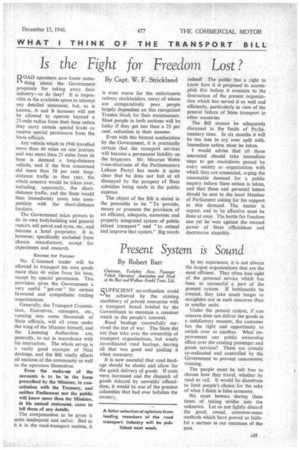Is the Fight for Freedom Lost ?
Page 45

If you've noticed an error in this article please click here to report it so we can fix it.
By Capt, W. F. Strickland
ROAD operators now know some thing about the Government proposals for taking away their industry—or do they? It is impossible in the available space to attempt any detailed statement, but, as is known, A and B licensees will not he allowed to operate beyond a 25-mile radius from their base unless they carry certain special loads or receive special permission from the State officials.
Any vehicle which in 1946 travelled more than 40 miles on one journey and was more than 25 miles from its base is deemed a long-distance vehicle, and if the firm concerned did more than 50 per cent. longdistance traffic in that year, the whole concern would be taken over, including, apparently, the shortdistance traffic, and the State would then immediately come into competition with the short-distance hauliers.
The Government takes powers to do its own bodybuilding and general repairs, sell petrol and tyres, etc., and become a hotel proprietor. It is, however, specifically excluded from chassis manufacture, except for experiment and research.
Excuse for Favour No C-licensed trader will be allowed to transport his own goods more than 40 miles from his base, except by special permission. This provision gives the Government a very useful " get-out " for certain favoured and sympathetic trading organizations.
Generally, the Transport Commission, Executives, managers, etc., running into some thousands of State officials, will all come under the wing of the Minister himself, and the Licensing Authorities are, generally, to act in accordance with his instruction. The whole set-up is a really good example of Nazi doctrine, and the Bill vitally effects all sections of the community as well as the operators themselves.
Even the make-up of the accounts is to be in the form prescribed by the Minister, in consultation with the Treasury, and neither Parliament nor the public will know more than the Minister, in his annual statement, cares to tell them of any details.
The compensation to be given is quite inadequate and unfair. Bad as it is in the road-transport section, it is even worse for the unfortunate railway stockholders, many of whom are comparatively poor people largely dependent on this recognized Trustee Stock for their maintenance. Most people in both sections will be lucky if they get less than a 25 per cent, reduction in their income.
Even with this blatant confiscation by the Government, it is practically certain that the transport services will become a permanent liability on the taxpayers. Mr. Maurice Webb (vice-chairman of the Parliamentary Labour Party) has made it quite clear that he does not feel at all dismayed by the prospect of State subsidies being made at the public expense.
The object of the Bill is stated in the preamble to be "To provide, secure or promote the provision of an efficient, adequate, economic and properly integrated system of public inland transport" and "to , extend and improve that system." Big words indeed! The public has a right to know how it is proposed to accomplish this before it consents to the destruction of the present organization which has served it so well and efficiently, particularly in view of the general failure of State transport in other countries.
The Bill cannot be adequately discussed in the limits of Parliamentary time. In six months it will be too late to cry over spilt milk. Immediate action must be taken.
I would advise that all those interested should take immediate steps to get resolutions passed by every society or organization with which they are connected, urging the reasonable demand for a public inquiry before State action is taken, and that these and personal letters should be sent to the local Member of Parliament asking for his support to this demand. The matter is urgent, and to be effective must be done at once. The battle for freedom can yet be won against the massed power of State officialdom and doctrinaire stupidity.












































































